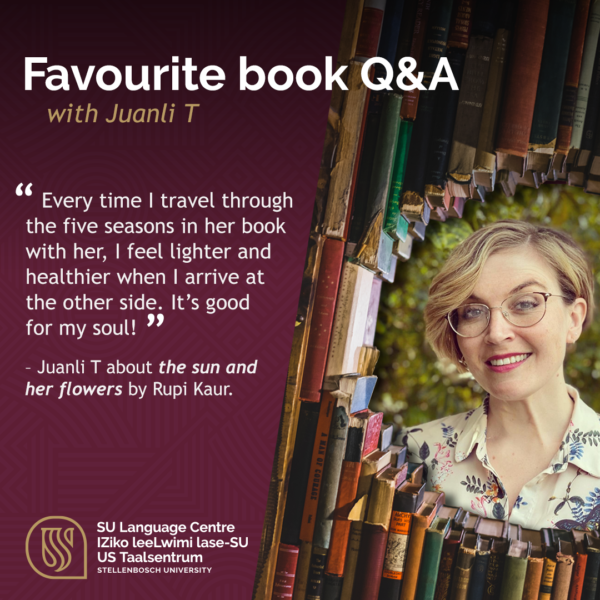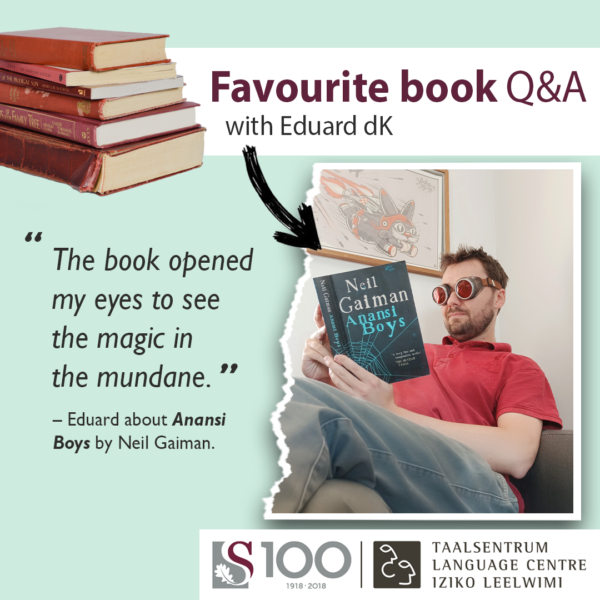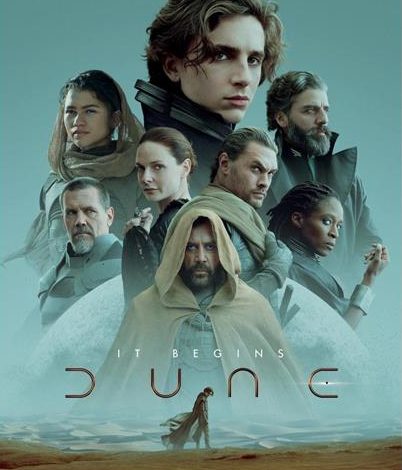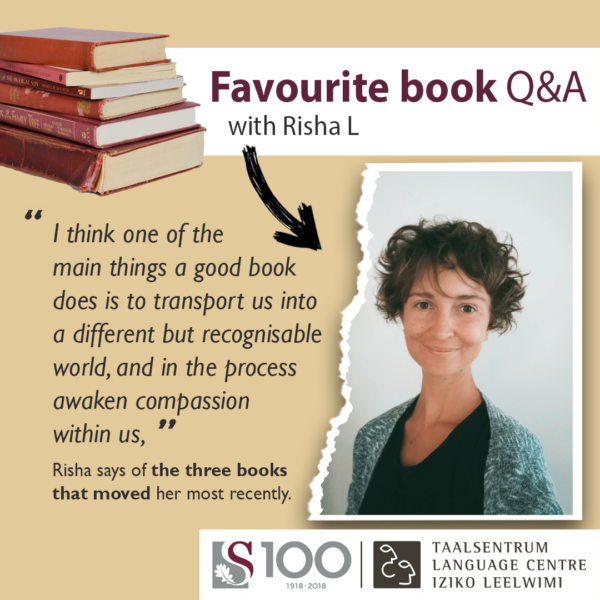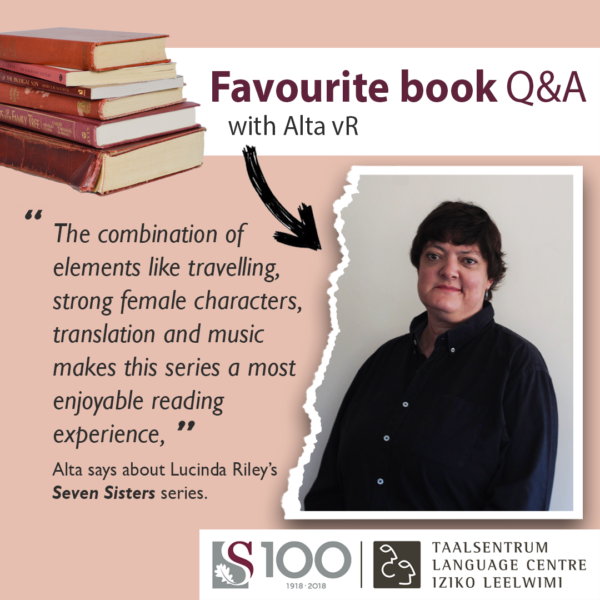Book chat with Susan L
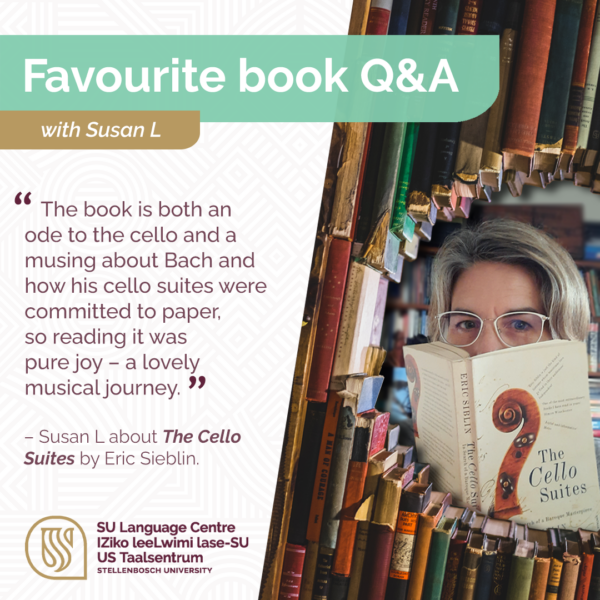
Get to know us through the books we read!
This month we chat to Susan Lotz. She is a language practitioner and content coordinator at the Language Centre. “Among other things, I coordinate content and messaging at the Language Centre to create awareness of the Centre’s activities and to promote multilingualism at the University,” she explains.
What is die title of your favourite book, or a book that is memorable for some or other reason?
There are many, since I tremendously enjoy reading, but the one I would like to share today is The Cello Suites by Eric Sieblin.
Why did this book make such an impression on you?
I love cello music and Johann Sebastian Bach is one of my favourite composers. This book is both an ode to the cello and a musing about Bach and the circumstances during which the cello suites (which I absolutely adore) were committed to paper, so it gave me exceptional joy to read it. It also introduced me to Catalan cellist Pablo Casals, which was a wonderful discovery in itself, since it gave me some more exceptional music to explore. The book is not technical at all, and it is well written and gripping – the author weaves several storylines together, so it’s really hard to put down! It’s a veritable feast of a musical journey that resonated deeply with me.
Who is (are) your favourite author(s)? Also tell us why?
I think it depends on where I’m at – I’ve really enjoyed books by authors like Ingrid Winterbach, Lien Botha, Deon Meyer, Stieg Larsson, Laurie R King, Margaret Atwood, Jeanette Winterson, Neil Gaiman and Terry Pratchett. I also devoured the Game of Thrones books by George RR Martin, which I prefer to the filmed series Two Irish authors I return to time and again are Niall Williams and Maggie O’Farrel.
What are you reading at the moment?
Where the Crawdads Sing, by Delia Owens, and Skepsel by Willem Anker (a re-read, because I just so love the Afrikaans writing in this book).
Do you have a preference: reading physical books with paper pages or on a Kindle or other electronic platform? Why do you say so?
Physical books win every time. I spend so much time reading words on a screen as part of my job and life that reading words on paper is a real treat for me. But I’m flexible – if I have access to a book on my tablet, the tablet becomes my companion for the duration of the book. The idea of killing fewer trees does appeal to me, I must confess. I’d rather buy pre-read books for that reason, if possible, or borrow a book.
What book have you re-read? Also tell us why?
The Cello Suites, to enjoy it all over again, and one cannot possibly retain or absorb all the information the first time round; and Minoes, because it’s such a fun book! Also, now and again a Harry Potter book (JK Rowling), to remember who fits in where, to reminisce about where I was the first time when I read them, and to have conversations about the story and characters with my nieces. Four Letters of Love by Niall Williams just because it’s so dreamy and it feels as if one is right there in the Irish landscape with the characters when you read the story. I revisit books that did something special for me!
Who is your favourite literary character?
Minoes (in Minoes by Annie MG Schmidt, the Afrikaans translation of the original Dutch). Minoes is a cat and a girl – often both at the same time!
Have you perhaps learnt a life lesson from a book or character that you would like to share with us (if this hasn’t come up in one of your answers already)?
A character like Salander in The girl with the Dragon Tattoo inspires and challenges me to be brave and deal with whatever needs to be dealt with, and reminds me that it’s really fine also to be eccentric.
I think most stories contain life truths. It depends on whether you are open to absorb or hear them.”
What book/books would you recommend to your students, friends or anyone else?
Yes, here are a few music stories:
The Cello Suites by Eric Sieblin
A Genius in the Family by Hilary and Piers du Pré
An Equal Music by Vikram Seth (there’s even an official compilation of all the pieces mentioned in the book on CD, probably available on music streaming services as well)
As It is in Heaven by Niall Williams (with lots of Vivaldi)
The Concert Pianist by Conrad Williams
And a few other recommendations:
The Little Prince by Antoine de Saint Exupéry
Four Letters of Love by Niall Williams
My Dream of You by Nuala O’Faolain
After You’d Gone by Maggie O’Farrel
The Girl with the Dragon Tattoo trilogy by Stieg Larsson
The Game of Thrones books by George RR Martin
The MadAddam trilogy by Margaret Atwood
Folly by Laury R King
Extremely Loud and Incredibly Close by Jonathan Safran Foer
Lighthousekeeping by Jeanette Winterson
Forests of the Heart by Charles de Lindt
Good Omens by Terry Pratchett and Neil Gaiman
The Witches trilogy by Terry Pratchett (and then you’ll be hooked)
And something in Afrikaans:
Skepsel by Willem Anker
Die Aanspraak van Lewende Wesens by Ingrid Winterbach
Wonderboom by Lien Botha
Verlorenkop by Celesté Fritze
